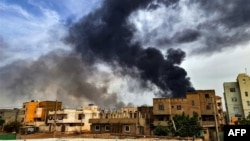Sudan's army has been battling to defend a military industrial complex believed to contain large stocks of weapons and ammunition in southern Khartoum, close to fuel and gas depots that are at risk of exploding, residents said on Wednesday.
The paramilitary Rapid Support Forces (RSF), in the eighth week of a power struggle with the army, had attacked the area containing the Yarmouk complex late on Tuesday before retreating after heavy fighting, witnesses said. Clashes could still be heard on Wednesday morning.
The RSF quickly seized swathes of the capital after war erupted in Khartoum on April 15. Army air strikes and artillery fire have shown little sign of dislodging them, but as the fighting drags on the RSF may face a challenge restocking with ammunition and fuel.
Fighting across the three cities that make up Sudan's greater capital region — Khartoum, Bahri and Omdurman — has picked up since a 12-day cease-fire formally expired on June 3 after repeated violations.
"Since yesterday there has been a violent battle with the use of planes and artillery and clashes on the ground and columns of smoke rising," Nader Youssef, a resident living near Yarmouk, told Reuters by phone.
Due to the proximity of fuel and gas depots, "any explosion could destroy residents and the whole area," he said.
The fighting derailed the launch a transition towards civilian rule four years after a popular uprising ousted strongman president Omar al-Bashir. The army and RSF, which together staged a coup in 2021, fell out over the chain of command and military restructuring plans under the transition.
Water shortages
The conflict has wreaked havoc on the capital, triggered new outbursts of deadly violence in the long volatile western region of Darfur, and displaced more than 1.9 million people.
Most health services have collapsed, power and water is often cut, and looting has been spreading.
In Bahri, north of the Blue Nile from Khartoum, local activists said that more than 50 days of water cuts had driven many people from their homes and that they were caught between having nothing to drink and being trapped in the crossfire as they searched for water.
More than 1,428,000 people have been driven from their homes within Sudan and a further 476,800 have fled into neighbouring countries, most of which are already struggling with poverty and internal conflict, according to estimates published on Tuesday by the International Organization for Migration (IOM).
Sudan's health ministry has recorded at least 780 civilian deaths as a direct result of the fighting. Hundreds more have been killed in the city of El Geneina in West Darfur. Medical officials say many bodies remain uncollected or unrecorded.
The deal for the cease-fire that ended on Saturday was brokered by Saudi Arabia and the United States at talks in Jeddah, where a mediator said negotiations were continuing in an effort to provide safe passage for humanitarian assistance.
Consultations for a new truce deal, which had been reported by Saudi TV station Al Arabiya on Tuesday, were at an early stage and complicated by the continued fighting, the source said.
The United Nations says aid that could reach about 2.2 million people had been delivered since late May but that some 25 million — more than half the population — are in need of assistance.







